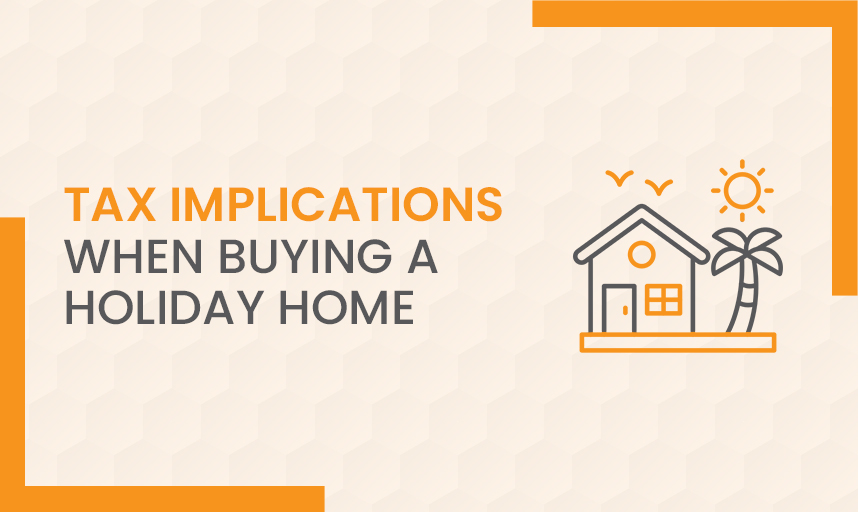Have you ever dreamt of owning a holiday home by the beach or in the serene countryside? For many Australians, it’s not just a dream but a real investment opportunity.
But before you get swept away in visions of weekend getaways, here’s a reality check: tax implications.
Renting out your holiday home can be a great way to compensate for the costs, but the Australian Tax Office (ATO) has a keen eye on holiday home deductions. Let’s understand important tax implications that every prospective buyer should be aware of.
Understanding Tax Obligations
Purchasing a holiday home isn’t just about relaxation, it’s also a financial decision with tax implications. Any income earned from renting out your holiday home is taxable and must be declared on your tax return. However, this also means that you can claim tax deductions for expenses incurred in earning that income.
Renting Out Your Holiday Home - Income and Deductions
Let’s say you decide to share your holiday home with others when you’re not using it. Any income you earn from renting it out is considered assessable income by the Australian Tax Office (ATO). Think of it as finding a tenant who helps pay the bills!
The good news is, you’re not alone in the tax jungle. Since that rental income adds to your taxable income, the ATO allows you to claim deductions for expenses incurred while earning that income. In simpler terms, you can reduce your taxable income by claiming the costs associated with renting out your holiday home.
Here’s a handy table to summarise the types of deductions you can claim, depending on how much of your property you rent out:
| Expenses | Deductible? |
| Service fees | Yes |
| Cleaning supplies | Yes |
| Property taxes | Yes |
| Property insurance | Yes |
| Marketing and advertising costs | Yes |
| Utilities | Yes |
| Maintenance and repair costs | Yes |
| Travel expenses | No |
| Acquiring and disposing costs | No (Capital expense) |
| Expenses paid by tenants | No |
| Unrelated expenses (e.g., loan interest) | No (Non-deductible) |
| Depreciation costs | Yes (Over several years) |
| Capital works deductions | Yes (Over several years) |
The ATO Wants Proof - What's Required?
The ATO is like a detective when it comes to holiday home deductions. They want to make sure you’re not claiming deductions for personal getaways disguised as “rental periods.”
Here are key aspects the ATO looks out for:
- Limited advertising: Only advertising your holiday home on a local noticeboard or during off-peak seasons might raise eyebrows.
- Location, location, location: If your holiday home is in a remote location with limited appeal to renters, the ATO might question its genuine availability for rent.
- Unreasonable rental conditions: Demanding sky-high rents, refusing families with children, or having overly strict rules could indicate you’re not serious about renting.
- Mates’ rates: If you rent to friends or family for a low rent, you may only be able to deduct the amount that you really receive.
Expenses You Can't Claim
While there are numerous deductible expenses associated with owning a holiday home, there are also costs that cannot be claimed as deductions:
- Costs related to acquiring and disposing of the property, including conveyancing costs and stamp duty, are considered capital expenses.
- Expenses paid by the tenant, expenses unrelated to property rental, and travel expenses associated with renting the property are not deductible.
- Certain expenses, like repair costs and renovation expenses, are deductible over several years rather than immediately.
Joint Ownership Considerations
For properties jointly owned by spouses, it’s essential to divide income and deductions equally between the owners to comply with tax regulations. The ATO closely monitors cases where income and deductions are unfairly distributed between spouses.
Maintaining Compliance and Records
To ensure compliance and justify tax deductions, it’s imperative to maintain accurate records of income and expenses associated with the holiday home. The ATO has access to various sources of third-party data, including rental listing sites, making it easier for them to verify claims related to property availability for rent.
Conclusion
Owning a holiday home can be a fantastic way to create lasting memories with loved ones. By understanding the tax implications and claiming legitimate deductions, you can turn your dream into a tax-savvy reality.
While this blog equips you with the basics, handling the tax system, especially with specific situations, can be tricky. And for this you can rely on KPG Taxation registered tax agents who can help you understand various tax implications and ensure you’re claiming all the deductions you’re entitled to.





